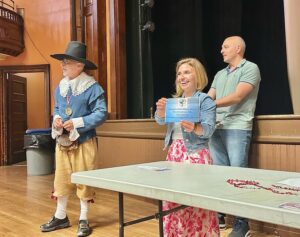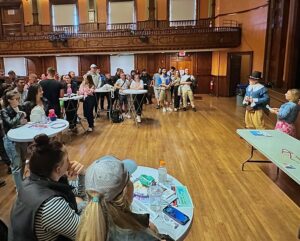PROVINCETOWN — The hundreds of international students who come to the Outer Cape through the U.S. State Dept.’s Summer Work Travel program will still be here this year, despite a recent disruption to the scheduling of interviews for the J-1 visas that allow them to travel.

That is because nearly all of the 344 students who are headed to Provincetown this year have already had their visa interviews, and most have their visas in hand, according to Maria Dzhenkova and Bobby Ghadzev of the Bulgarian agency Cool Travel, which helps students secure job offers, housing, and visas.
Scores of students have already arrived in Provincetown and the other Outer Cape towns, where they are moving into seasonal housing, testing out new bicycles, and starting work in local businesses as cashiers, food runners, and baristas.
Sixty-six students are scheduled to work in Truro this year, 131 in Wellfleet, 47 in Eastham, and 87 in Orleans, according to an online State Dept. map of the program.
Interviews on Hold
A “pause” on scheduling new visa interviews was announced in a May 27 cable from Secretary of State Marco Rubio to all U.S. embassies overseas. The pause will allow the State Dept. to establish “enhanced social media vetting” for all applicants for three classes of visas — F and M visas, which allow for study at U.S. schools, and J visas, which include exchange programs for professors, researchers, teachers, camp counselors, and au pairs, in addition to the Summer Work Travel program that is popular on Cape Cod.

About 1.3 million international students held F visas in 2023, according to State Dept. figures, while about 100,000 students participated in the Summer Work Travel program.
The May 27 “pause” followed a March 25 cable that directed embassy officials to scrutinize the social media accounts of returning students for “evidence that an applicant advocates for terrorist activity or otherwise demonstrates a degree of public approval or public advocacy for terrorist activity or a terrorist organization,” according to reporting in the New York Times and the Guardian.
“One of the main aims of the social media searches is to reject the applications of students who have expressed sympathy for Palestinians,” the New York Times reported on April 1.
The Times also asked the State Dept. in March whether artificial intelligence programs would be used to scan social media accounts; an agency spokesperson answered indirectly, writing that “all available technology” would be used in the scans.
Once the “pause” is over and visa interviews resume, U.S. embassies will presumably be prepared to scan millions of social media accounts per year to detect certain kinds of “public approval or public advocacy,” including support for Palestinians in Gaza.
Searches might not only be happening at visa interviews — two J-1 students from Bulgaria who asked to remain anonymous told the Independent that they had to turn over their phones and computers upon arrival at Logan International Airport in Boston and wait almost four hours while their social media accounts were searched. One said that when his computer was returned to him, it was clear that agents had perused his Reddit account to see what he had been reading.
“I’m not that vocal about my political views and opinions, and I think that’s why I didn’t get into trouble,” one of the students told the Independent. “I was warned by friends in the U.K. not to come here,” he said, but he had already paid almost $3,000 for program expenses and flights, and canceling his summer plans would have cost too much.
Just in Time
Because the “pause” on scheduling visa interviews was announced so late in May, the Outer Cape’s J-1 students were largely unaffected. Almost all interviews for students who start work in May or June take place in March, April, or May, said Dzhenkova, and a student she’s working with was allowed to attend a previously scheduled interview on May 28.
The visa approval rate at the U.S. embassy in Bulgaria has also been high this spring — over 99 percent for J-1 applicants, according to Dzhenkova and Ghadzev.
Although Bulgaria accounts for the vast majority of the Outer Cape’s J-1 students, other countries are also sending students here this year, including Jamaica, Kazakhstan, Ukraine, and Turkey, Dzhenkova said. Those countries have two features in common: academic calendars that allow college students to come to Cape Cod in May, the traditional beginning of the summer work season here, and currencies that are relatively weak against the dollar.
Several J-1 students have told the Independent that they can earn more in one summer here than their parents earn in a year.
A Warm Welcome
Dzhenkova and Ghadzev, both former J-1 students themselves, organized an event at Provincetown Town Hall on May 28 to welcome this year’s students and introduce them to some of the town’s civic and business leaders.
Provincetown Police Chief Greg Hennick was there, as was Diversity, Equity, and Inclusion Director Donna Walker, Chamber of Commerce Director Radu Luca, TD Bank managers Craig Turner and Denista Russe, and Ptown Bikes manager Josh Larkins.
Turner described TD Bank’s free student banking program and mentioned that Russe is from Bulgaria and can help students with their banking questions.
Larkins described his shop’s summer bike program, in which students can pay $225 for a used bike, get simple repairs done for free, and sell the bike back for $75 at the end of the season.
Hennick described the town’s bicycle safety rules — including that electric vehicles can travel only one way on Commercial Street — and asked students to ride their bikes at a reasonable speed. “If you need anything, please don’t feel afraid to call us — we are here for you,” Hennick said.
Provincetown’s town crier Daniel Gómez Llata helped raffle off donated prizes, including a pair of whale watch tickets and a $375 gift certificate for Ptown Bikes. Dozens of pizzas were donated by Provincetown House of Pizza, with the free food helping to draw about 80 students to the event.
The welcome was meant to improve communication between business leaders, civic leaders, J-1 students, and people experienced with the program, Dzhenkova said, especially in light of the State Dept.’s heightened scrutiny of Provincetown last year. The fact that some J-1 students had taken second jobs driving pedicabs had resulted in a blacklist of some businesses that employed those students last spring — but that situation has been resolved, Dzhenkova said, and some of those business owners told the Independent they are again sponsoring students this year.
“There is a good support system here that we can create for these students,” Dzhenkova said. “We’re trying to build that community around the summer workforce.”



